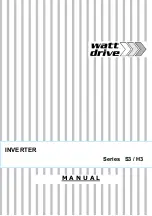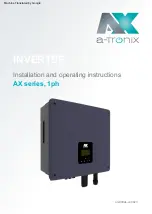
1
TABLE OF CONTENTS
Introduction . . . . . . . . . . . . . . . . . . . . . . . . . . . . . . . . . . . . . . . . . . . . . . . . . . . 1
How This Inverter Works . . . . . . . . . . . . . . . . . . . . . . . . . . . . . . . . . . . . . . . . . . 1
Principle of Operation . . . . . . . . . . . . . . . . . . . . . . . . . . . . . . . . . . . . . . . . . . 1
The Power Inverter Output Waveform . . . . . . . . . . . . . . . . . . . . . . . . . . . . . . . 2
Protective Features of the Inverter . . . . . . . . . . . . . . . . . . . . . . . . . . . . . . . . . . . . 2
Installation and Operating Instructions . . . . . . . . . . . . . . . . . . . . . . . . . . . . . . . . 3
Power Source Requirements . . . . . . . . . . . . . . . . . . . . . . . . . . . . . . . . . . . . . . 3
Connecting to a Power Source Using the Accessory Outlet Plug . . . . . . . . . . . . 3
Connecting to a Power Source Using the Provided Cables . . . . . . . . . . . . . . . . 3
Direct Hardwiring to Power Source . . . . . . . . . . . . . . . . . . . . . . . . . . . . . . . . 4
Connection To Load . . . . . . . . . . . . . . . . . . . . . . . . . . . . . . . . . . . . . . . . . . . 4
Placement of the Inverter . . . . . . . . . . . . . . . . . . . . . . . . . . . . . . . . . . . . . . . . 5
Operating Tips . . . . . . . . . . . . . . . . . . . . . . . . . . . . . . . . . . . . . . . . . . . . . . . 5
Operation of the USB Power Port . . . . . . . . . . . . . . . . . . . . . . . . . . . . . . . . . . 6
Care and Maintenance . . . . . . . . . . . . . . . . . . . . . . . . . . . . . . . . . . . . . . . . . .
6
Storage . . . . . . . . . . . . . . . . . . . . . . . . . . . . . . . . . . . . . . . . . . . . . . . . . . . . 6
Maintenance . . . . . . . . . . . . . . . . . . . . . . . . . . . . . . . . . . . . . . . . . . . . . . . . 6
Troubleshooting . . . . . . . . . . . . . . . . . . . . . . . . . . . . . . . . . . . . . . . . . . . . . . .
7
Common Audio/Visual Problems . . . . . . . . . . . . . . . . . . . . . . . . . . . . . . . . . . 7
Fault Protection Code and Troubleshooting Guide . . . . . . . . . . . . . . . . . . . . . . 7
Specifications . . . . . . . . . . . . . . . . . . . . . . . . . . . . . . . . . . . . . . . . . . . . . . . . . . 8
INTRODUCTION
Your new
Power On Board
®
500 Watt Power Inverter
is one in a series of
the most advanced DC to AC inverters available today. With proper care and
appropriate usage, the inverter will give you years of dependable service.
The Power Inverter supplies 500 watts of continuous power, in the form of two
household-type outlets that are ready to deliver 120 volt AC power whenever and
wherever you need it. The power inverter has enough power to operate almost any
household or electric appliance, including color TVs (up to 20") TV/VCR
combinations, DVD/CD players, laptop computers, camcorders, cellular phones,
power tool chargers, lamps and more.
The power inverter comes equipped with battery clips to handle higher
amperage/load applications. Added safety features include automatic shutdown to
prevent damage to your source battery.
This power inverter incorporates a new cooling technology that cools the power
transistors and increases the reliability and life of the inverter.
HOW THIS INVERTER WORKS
The power inverter converts low voltage DC (direct current) from a battery or other
power source to standard 120 volt AC (alternating current) household power.
Principle of Operation
The inverter converts power in two stages. The first stage is a DC to DC conversion
process that raises the low voltage DC at the inverter input to 145 volts DC. The
second stage is the actual inverter stage that converts the high voltage DC current into
120 volts, 60 Hz AC current.
PI500CP_ManualEN_010807 1/8/07 4:48 PM Page iv























